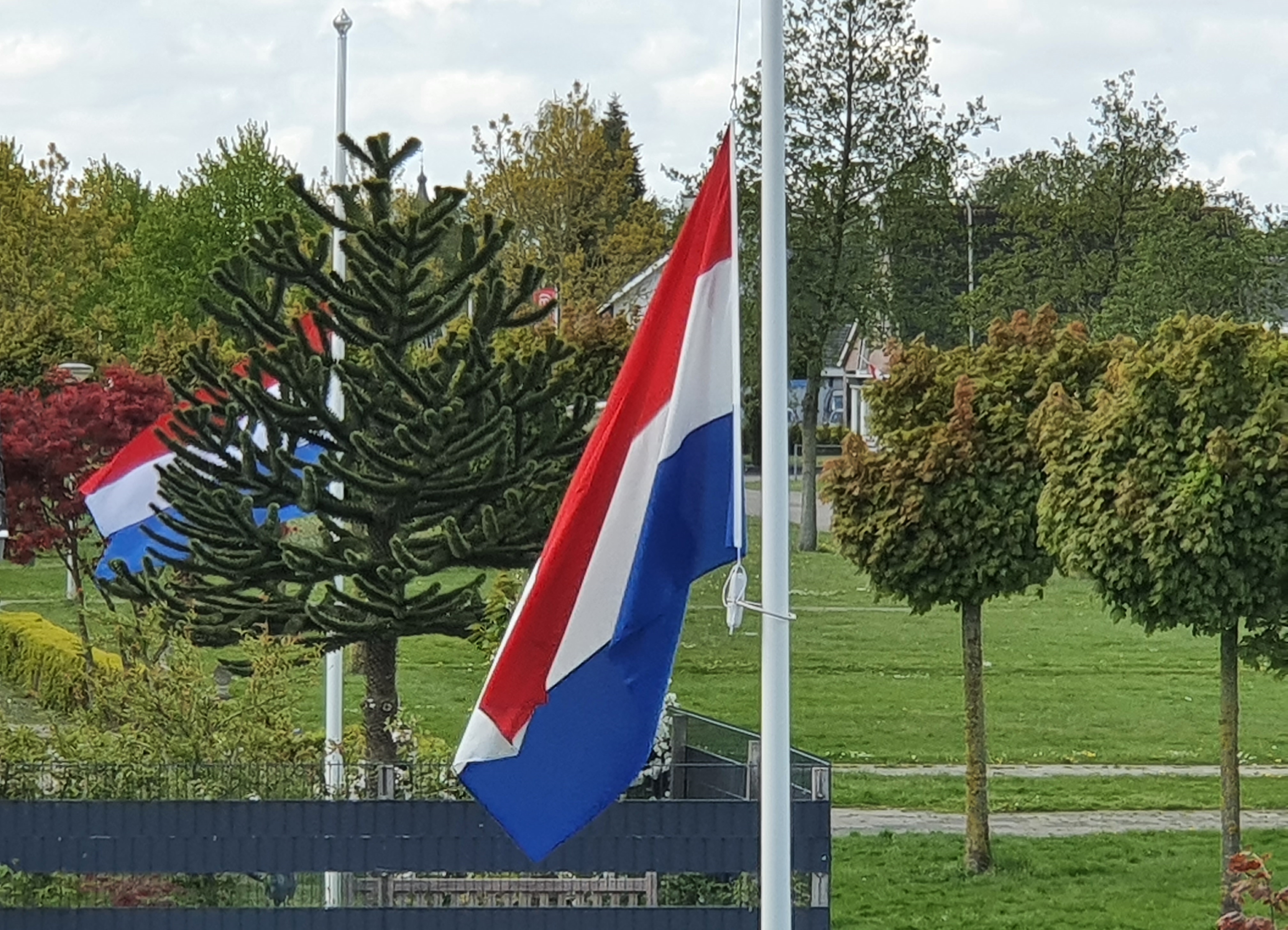WEST GERMANIC
Commemorate
Linguistics
| 04-05-2020
Today is National Remembrance Day in the Netherlands. This country was liberated 75 years ago and the dead have been commemorated on 4 May since 1946. But what does that actually mean, commemorate? Why do we call it that?

My first memory of the commemoration of the dead is from when I was about 10 years old and I was humming in bed. I remember, because my sister came up a little later and told me they had heard me during the two minutes of silence. From the way she said that, I could infer that it was a bad thing, something disrespectful – that's probably why it stayed with me. This anecdote indicates something that I think fits my generation: we have learned a lot about the Second World War and have also known people who have experienced the war, but at the same time it was really something from history. I think that's different for the generation of my parents, who have not experienced the war, but have learned in their upbringing that their parents did live through the war. I remember as a child I often wondered during the commemoration what exactly I had to think about for the two minutes of silence. For the generations after mine, including the children I now teach, that may be even more difficult to imagine. Hence my question: what does 'commemoration' actually mean, 75 years after the Second World War? What does the meaning of the word say about it?
Her-denken
If we look purely at the way the word is formed, the Dutch word for commemorate, herdenken, is easy to dissect: we have the verb denken (to think), with the prefix her-, which means '(once) again'. That her- probably originated from the French re-, in which the sound has been reversed (metathesis, as with Dutch gort) and a hyper correct h has been added. Literally, herdenken therefore means 'to think again (about)'. You don't have to have experienced something yourself to commemorate it.
The Frisian word for commemorate is betinke, which has the same structure as herdenken: the verb tinke, prefixed with be-. What is special here, is that betinke not only means 'to commemorate', but also 'to devise' and 'to think again'.
Gedenken A Dutch word related to herdenken ('celebrating the memory') is gedenken ('dwelling on' or 'remembering'), which feels more appropriate to me on National Remembrance Day. In German, both meanings coincide in the word gedenken. A commemoration is called a Gedenkfeier or Gedächtnisfeier, in which -feier can be translated as celebration. I may have an overly cheerful or noisy association with the word 'celebrate', but I have some difficulty in reconciling that word with commemoration of the dead. During the two minutes of silence and the ceremony surrounding it, I try to dwell on the horrors of World War II and the lives they cost, while also thinking with respect and gratitude about all the unknown-to-me people who made the freedom in which I live possible, during that war and afterwards. For me, the commemoration of the dead mainly has to do with "dwelling on" and "being still for". German by the way has a nice word for that moment of silence: Schweigeminute.
Commemorate
The English word commemorate, like herdenken, consists of two morphemes (com + memorate), but the prefix does not mean 'again' here. It's probably an intensive prefix, so a prefix meant to reinforce the word that follows. That word here is memorate, which originates from Latin memor. This is also the root word of memorial (both 'monument' and 'ceremony', amongst other meanings) and memory. The Online Etymology Dictionary nicely defines commemorate: "perpetuate the memory of". By commemorating you make the memory infinite and, mentally speaking, you make the dead immortal. Without wanting to make this piece too philosophical, I think that's a nice thought to conclude with.

Dutch flags at half mast
SilenceMy first memory of the commemoration of the dead is from when I was about 10 years old and I was humming in bed. I remember, because my sister came up a little later and told me they had heard me during the two minutes of silence. From the way she said that, I could infer that it was a bad thing, something disrespectful – that's probably why it stayed with me. This anecdote indicates something that I think fits my generation: we have learned a lot about the Second World War and have also known people who have experienced the war, but at the same time it was really something from history. I think that's different for the generation of my parents, who have not experienced the war, but have learned in their upbringing that their parents did live through the war. I remember as a child I often wondered during the commemoration what exactly I had to think about for the two minutes of silence. For the generations after mine, including the children I now teach, that may be even more difficult to imagine. Hence my question: what does 'commemoration' actually mean, 75 years after the Second World War? What does the meaning of the word say about it?
Her-denken
If we look purely at the way the word is formed, the Dutch word for commemorate, herdenken, is easy to dissect: we have the verb denken (to think), with the prefix her-, which means '(once) again'. That her- probably originated from the French re-, in which the sound has been reversed (metathesis, as with Dutch gort) and a hyper correct h has been added. Literally, herdenken therefore means 'to think again (about)'. You don't have to have experienced something yourself to commemorate it.
The Frisian word for commemorate is betinke, which has the same structure as herdenken: the verb tinke, prefixed with be-. What is special here, is that betinke not only means 'to commemorate', but also 'to devise' and 'to think again'.
Gedenken A Dutch word related to herdenken ('celebrating the memory') is gedenken ('dwelling on' or 'remembering'), which feels more appropriate to me on National Remembrance Day. In German, both meanings coincide in the word gedenken. A commemoration is called a Gedenkfeier or Gedächtnisfeier, in which -feier can be translated as celebration. I may have an overly cheerful or noisy association with the word 'celebrate', but I have some difficulty in reconciling that word with commemoration of the dead. During the two minutes of silence and the ceremony surrounding it, I try to dwell on the horrors of World War II and the lives they cost, while also thinking with respect and gratitude about all the unknown-to-me people who made the freedom in which I live possible, during that war and afterwards. For me, the commemoration of the dead mainly has to do with "dwelling on" and "being still for". German by the way has a nice word for that moment of silence: Schweigeminute.
Commemorate
The English word commemorate, like herdenken, consists of two morphemes (com + memorate), but the prefix does not mean 'again' here. It's probably an intensive prefix, so a prefix meant to reinforce the word that follows. That word here is memorate, which originates from Latin memor. This is also the root word of memorial (both 'monument' and 'ceremony', amongst other meanings) and memory. The Online Etymology Dictionary nicely defines commemorate: "perpetuate the memory of". By commemorating you make the memory infinite and, mentally speaking, you make the dead immortal. Without wanting to make this piece too philosophical, I think that's a nice thought to conclude with.
WEST GERMANIC
In the West Germanic section, I every other week discuss a word that strikes me. I look at the meanings and forms of the word, and especially at where the word originates from. With that I compare the four West Germanic languages Dutch, English, Frisian and German, with the occasional inevitable trip across the fictional West Germanic border.
Sources
For writing this piece, I used etymologiebank.nl, taalweb.frl, dwds.de, etymonline.com and Van Dale Studiewoordenboek Engels-Nederlands (2006).
Image: own photo.
